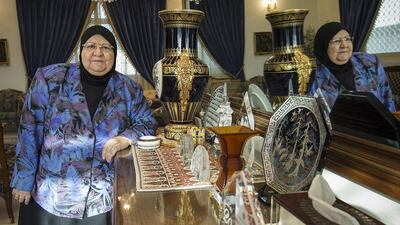Abu Dhabi // When Nazmieh Al Abed was a teenager, she volunteered in the Palestinian refugee camps in Beirut to teach the women there how to read and write.
It was an early indication of the vital role she was to play as a teacher, a school principal and an inspiration to so many generations of children in Lebanon and the UAE.
“They needed people. People who could take them by their hands and support them. And it was us – a group of scouts. At that time I was 14,” she says.
“Why did I want to be a teacher? All my life, I loved children. I took care of my brothers and sisters, because my mother was sick. And I used to take care of our neighbours’ children.”
Originally from Palestine, Mrs Al Abed began her career in 1961 at a school in Lebanon.
“When I finished my high-school diploma, I saw myself in front of a classroom – teaching, lecturing, loving. As a mother for my students.”
But the gathering storm in 1970s Lebanon changed the course of her life for ever.
“When the civil war erupted, we were lucky to find a way to come to Abu Dhabi. We were in Abu Dhabi in December 1975 – the war started in April 1975.”
In 1976, when she was in her early 30s, she started teaching English in a government school in Abu Dhabi.
Mrs Al Abed then joined a private institution to teach maths, science and English to pupils in grades 5 and 6.
“To teach – it means to give the community, the society, people, the ability to face life with education, with knowledge.”
But then, in 1981, she felt it was time to retire and give her attention to her three children. “But I couldn’t. Number one, because I loved to work. Number two – because I love children, I love teaching. I feel I am blossoming in a classroom.”
It was then that Al Worood School in Abu Dhabi became Mrs Al Abed’s “fourth child”.
She started the institution in 1982 and would go on to be principal for the next 20 years, teaching more than 20,000 boys and girls until her retirement.
“I was very enthusiastic – very courageous. I wanted Al Worood pupils to be the best – the best manners, the best attitude.
“For 20 years I established it, paper by paper, sentence by sentence. It is my creation.”
The first task was modest, but of huge importance – securing books.
“The right foundation is to choose the syllabus, the teachers, decide on the levels, build the library – which was very important for me.”
Mrs Al Abed and her team wanted to create a “homogenous group of students” at every level, which she said was not easy. The first term began in September 1982, for pupils from kindergarten 1 to grade 6. Its aims? To instil and improve the English language-speaking skills of the pupils.
“We wanted it to be an English-medium school, so the students could cope with lots of programmes found in other schools and also when they join universities, they are able to join top universities.”
She had wanted her students to be “superior to others” in their reading and writing of English.
Mrs Al Abed, however, did not neglect the Arabic language.
Every year since its opening the school added a grade, until grade 12. As a principal, Mrs Al Abed created her own tactics to keep tabs on the pupils. “I used to wear Clarks shoes, because the soles were rubber. No one could hear me walking around.
“While we were building the school – I am short, 150 centimetres – I put chalk on my nose and told the engineer to make a glass square where my nose would hit the door. So when I am walking down the corridors, I can see what is going on in the classrooms.”
However, every successful story has its challenges and Nazmieh was at times full of doubts.
“I thought – will I succeed? Every day I used to think, today, I still think – what did I do? What did I give my people?
“It was a challenge for me. It was not easy. I wanted everything good and beautiful to come to my students. I wanted them to be happy.”
Mrs Al Abed, now a UAE national, retired in 2002, but still stays in touch with some teachers, staff and pupils. She looks back on her years as a principal and feels proud of a life of giving back to the UAE – a country she calls home.
“I felt I could give the country I loved most something good. I wanted to help youngsters to grow up to be more confident, more productive. I wanted to plant love. If you give love, you take love.”
aalkhoori@thenational.ae

